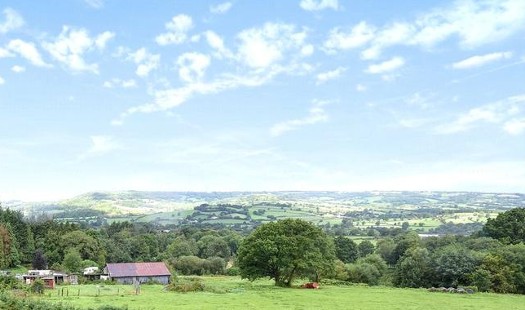 The image above is a view of the countryside as one proceeds up Northcote Hill going out of Honiton, Devon. It is here in 1922 my grandfather sold Lower Northcote Farm and used the proceeds to A: Purchase a residence in order to enjoy his retirement and B: Invest same to provide a retirement income.
The image above is a view of the countryside as one proceeds up Northcote Hill going out of Honiton, Devon. It is here in 1922 my grandfather sold Lower Northcote Farm and used the proceeds to A: Purchase a residence in order to enjoy his retirement and B: Invest same to provide a retirement income.
This retirement income came in the most part from shares in Lloyds Bank. In 1952 my grandfather died and the shares continued to provide an income for his widow (my grandmother) and his daughter (my aunt). In 1983, following the death of my aunt, my father and uncle received the shares and income equally. In the 1990s, my father (at my suggestion – and following my mother urging him to follow the suggestion) sold the greater part of the Lloyds Bank shares and re-invested the proceeds in the Dunedin Income Growth Investment Trust (DIGIT). When my father died just before midnight on Friday 11th July 2003, I inherited the shares. And the dividend income. The probate valuation of the shares was £3.08 per share.
In 2008, there was the “financial crisis” and the then government urged Lloyds Bank to take over the Halifax Bank.
Since that time I have increased my shareholding in Lloyds Bank. Taking into account the probate valuation, the average cost (including all purchase costs) per share is now 80 pence.
These shares are held by me in the manner they were held by my late father and my late grandfather. In certificated form and outside a “tax wrapper” – i.e.; an ISA. This means that the above costs per share (£3.08 & 80p) are VERY important! This is because were I to sell the shares any capital gain would be subject to tax. However, there is something known as a Capital Gains Allowance. For the current fiscal year (2019-2020) this is £12,000.
What this means is this: I would NOT pay ANY capital gains tax were I to sell the Lloyds Bank holding at £1.04 per share. Given that Lloyds Bank shares have been trading around the 49p price point today, many would regard that as a rather unlikely prospect!
Lloyds Bank is however a fortnight away from a very important date in it’s calendar. This is Thursday 29th August 2019. On this day it’s liability to pay out on any further PPI claims will end. These claims were largely as a result of the actions of the Halifax Bank.
Lloyds fortunes are inextricably tied with the health (or lack of) the UK economy. The UK economy’s fortunes are inextricably tied with Brexit (or Nobrexit). The reason why Lloyds shares are trading below 50p is due to the uncertainties about Brexit and not to any failings in the management of the company or any lack of performance of same. Thus the outlook for Lloyds (and, inter-alia the share price) is dependent on what happens in relation to Brexit.
IF the remainers and remainiacs succeed in halting Brexit (via another A50 extension and a “Remain” vote in a subsequent second referendum – or a binding confirmatory ballot following the enactment by the UK Parliament of the Withdrawal Agreement) the Lloyds share price will go up. A lot.
At that point, certain large US banks may become interested in taking Lloyds Bank over. These banks will not be stopped by the EU and UK competition authorities as these US banks have little or no market presence/share in the UK. Thus any representations made by the trades union to have the take-over stopped will fail. Any such takeover will likely be a “cash take-over”. Such take-overs are disliked in preference of “share takeovers” where the shares in the company being taken over are exchanged for shares taking the said company over. Such transactions are not liable for CGT, whereas cash transactions ARE.
What this could mean is this: I could receive a cheque through the post for many thousands of pounds (amounting to more than the shares book value [to me]) and not have to pay any CGT.
What would I do with the money?
Use all the proceeds to buy more shares in the DIGIT.
You see, I regard the shares in the DIGIT as being from the same source as the shares in Lloyds Bank – my grandfather’s farm. Therefore should I find the Lloyds shares being bought out from under me so to speak, the proceeds will be placed with the DIGIT shares. That way I keep my share of what was the family farm intact.
For most of my life, that family farm lay to the south and west of me. Now, that family farm lies to the east and north of me.
Other parts of my portfolio are linked to these investments.
After Royal Dutch Shell, my second most significant shareholding is Phoenix Group Holdings. You will note the statement regarding major shareholders on the company’s website (https://www.thephoenixgroup.com/investor-relations/major-shareholders.aspx):
The Company has been notified of the following significant holdings of voting rights in its shares:
Standard Life Aberdeen plc ~ 25.71%
BlackRock, Inc. ~ 5.39%
Artemis Investment Management LLP ~ 5.06%
This means that between them with 36.16%, these three corporate shareholders effectively control Phoenix Group. The largest, Standard Life Aberdeen (https://www.standardlifeaberdeen.com/what-we-do) has a close trading relationship with Phoenix Group. Part of that group (https://www.aberdeenstandard.com/en/who-we-are) is the manager of DIGIT (https://www.dunedinincomegrowth.co.uk/).
I regard the management teams in all these companies as extremely competent.
Competence is an important asset/commodity which is in terribly short supply insofar as the political class in this country are concerned.
Speaking the Truth unto the Nation
